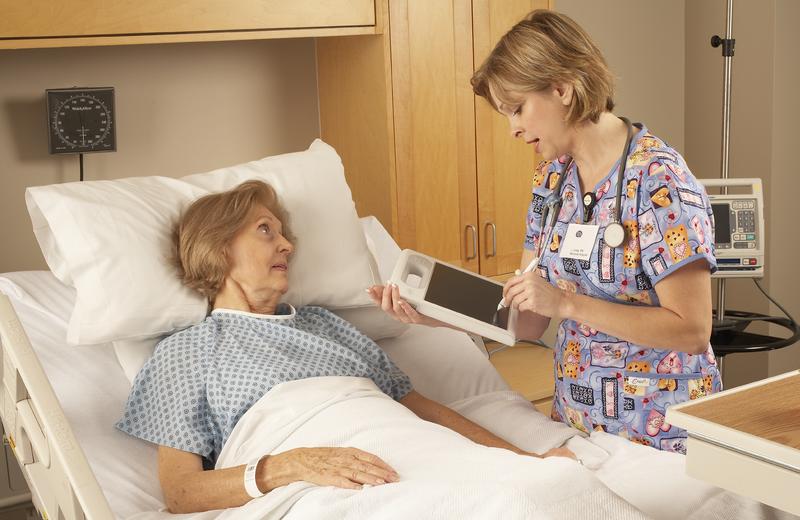New tablet PC for NHS
Intel and Motion Computing launch mobile clinical assistant to help nursing staff on their rounds.


Is it the end of the clipboard in hospitals? The National Health Service (NHS) is working with Intel and Motion Computing to produce a tablet computer for clinical use and to speed up the completion of paperwork, to give nursing staff more time to spend with patients.
The mobile clinical assistant (MCA) - essentially a tablet PC for medical use - was piloted at hospitals around the world, including Salford Royal in Manchester, after two years in development.
The device, designed from the ground up by Intel and Mobile Computing, will cost 1,199 and be released in about two months. Aside from wireless access to patient information, it features a bar code scanner, RFID capabilities, a wireless stethoscope, and a two megapixel digital camera. At present, the MCA has a hard drive between 30 to 60GB and 1.5GB RAM, as well as Bluetooth abilities. The battery life tops out at just three hours, but docking stations would be set up for on-the-go charging.
"It's not just a better tablet computer," said Nigel Owens, vice president of Motion Computing. He said the MCA is extremely durable and easily disinfected, physical necessities in such a demanding workspace. The body is made from chemical resistant resin, to withstand constant cleaning, and features liquid-proof microphones and minimal ports for germs to hide, making cleaning easy. The secure handle at the top was one of the features rated the highest by nurses.
Security was another major concern. To gain access to the MCA, the user's identification must be authenticated each use with an ID card and a PIN code. Because the data is uploaded to servers, minimal information will be held on the actual computers.
"This is the correct tool for the job and will make a significant difference to how medicine is practiced in the next two to five years," said Mike Bainbridge, senior clinical architect for NHS Connecting for Health.
Aside from improving accuracy in identifying patients and their prescriptions, the MCA can be used to track a patient's progress using the camera. Nurses can input information while at a patient's bedside, rather than tracking down the current portable computers - full-sized computers loaded onto trolleys.
Sign up today and you will receive a free copy of our Future Focus 2025 report - the leading guidance on AI, cybersecurity and other IT challenges as per 700+ senior executives
As the device allows real time access, nurses can respond to referrals while on their rounds. Using a paper system, if a patient requires a blood test, they must wait until a nurse comes off their rounds to see the note. Now, the nurse can receive the request and respond immediately. "Because a quicker blood test means a quicker diagnosis and quicker treatment, people can get out - and no one wants to be in hospital," said Salford staff nurse Jenny Quilliam.
And getting people out of hospital earlier opens up beds and saves money for the NHS, too. "You only need to save a few half days and you've bought one of those computers," said Bainbridge.
Bainbridge compared the MCA to an iPod, saying it is intuitive and easy to use, an opinion nurse Quilliam shares. "I was a bit sceptical at first, but after five minutes it was really easy to use," she said.
She said most patients weren't too concerned to see their nurses armed with portable computers. "Some were quite taken aback, asking 'what the hell is that'," Quilliam said. "But others didn't mind and a lot were just curious."
While the MCA is Intel's first platform built specifically for healthcare, some doctors - and now, even veterinary students - currently use mobile devices such as PDAs to track medical cases. Gordon Graylish, vice president of EMEA at Intel, said previous attempts at creating portable devices in hospitals failed because they were imposed on staff and interrupted their day-to-day workflow. "We really needed to observe how clinicians work to help enable, not encumber, them," said Graylish.
Freelance journalist Nicole Kobie first started writing for ITPro in 2007, with bylines in New Scientist, Wired, PC Pro and many more.
Nicole the author of a book about the history of technology, The Long History of the Future.
-
 UK government confirms October cyber breach: Everything we know so far
UK government confirms October cyber breach: Everything we know so farNews Details around Foreign Office hack remain sparse and government says it's unclear who is behind the attack
-
 Data center investment reached a record $61 billion this year
Data center investment reached a record $61 billion this yearNews Hyperscaler expansion, private equity interest, and a surge in debt financing are behind skyrocketing investment levels
